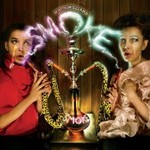|
|
 |
Dusted Reviews
Artist: White Williams Album: Smoke Label: Tigerbeat6 Review date: Jan. 7, 2008 |

|
|
|
 |
White Williams' Smoke collages familiar styles from the 1970s and the aughts into a gruesome, funky train wreck of an album. Each song is an imaginary party – a perilous one at that - described by its decorations alone. Williams appears to distance himself from lobbying for one single kind of listening; Smoke is to be enjoyed like silly putty.
As Dan Deacon, with whom he has toured, Williams as an arranger achieves a degree of artistry that could fairly be called virtuosic. More than a few of the songs reach a quite high plateau of postmodern dancey suaveness. The higher-register textures are gossamer, the percussion syrupy. His album might be compared to LCD Soundsystem's latest, except that Williams' obsession with (some similar) influences reads like destruction rather than reverence. That is to say, rather than dutifully recreating the conventions of a given moment in dance music history in a way that recasts that moment with more gestalt than specific intent, Williams rips it up and puts it back together all wrong. The head of Marc Bolan on the body of Bootsy Collins, or something like that. This is one way to go.
What meaning, then, do Williams' choices have? First, is Smoke a dance record in the standard sense? No. While it could and certainly will be danced to in recognizable ways, it is also made expressly available for alternative contemplations, potentially including strange kinds of dancing. Here I refer again to Dan Deacon, whose concerts invite idiosyncratic freakouts, ostensibly of no explicit character. Second, is William's ethos genuinely comparable to his aesthetically queerer funk-era influences? I think not, unfortunately, and I raise this comparison not only because of a general percussive emphasis and a sometimes hyperbolic 70s aesthetic, but because of a degree of possibly critical playfulness. At shows, for example, he has played a movie behind his band of cartoon characters stuck in mechanical cycles and carrying bags of money. The political hallmark of P-Funk et al. was to render absurd the most revered American symbols – the White House, the dollar bill – by experimenting with their representation in the laboratory of Afro-futurism. But it is not clear that Williams is interested in any parallel program - because he does not make it clear. Symbolism and lyricism, while consistently funny and colorful, only fleetingly appear coherent.
I suppose whether this matters or not depends on the listener, and people with certain viewpoints about the nature of art will prefer it that way. With this as a point of departure, one can and should praise Williams for writing often opaque but nevertheless gorgeous songs that are fun to hear as sonic artifacts alone, and that may be more democratic for lacking an overt message. The danger, of course, is that the music could be interpreted as nothingness rather than anythingness – as nihilistic, as style alone.
By Ben Tausig
|







